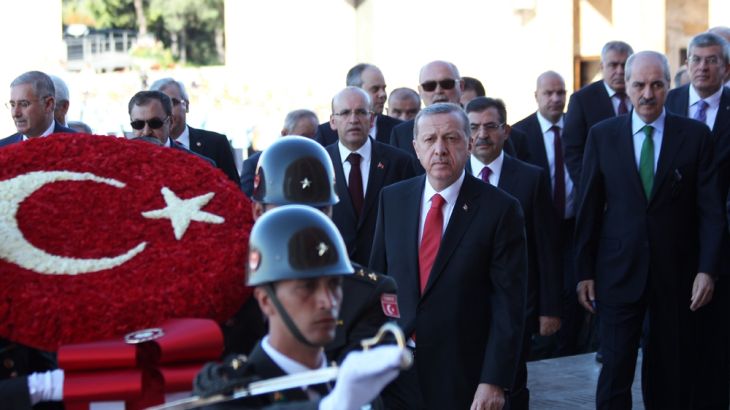
What is next for Erdogan’s AK party?
A conversation with Turkish voters on the political uncertainty reeling their country.
The AK party has been ruling Turkey for 13 years, but then a stunning defeat came in June.
The movement President Recep Tayyip Erdogan helped create, the Justice and Development Party, also known as the AK party, lost its majority in Parliament, throwing the political system into uncertainty.
Keep reading
list of 4 itemsNPR editor resigns after accusing US outlet of liberal bias
Lawmakers brawl as Georgian Parliament considers ‘foreign agent’ bill
Journalist loses foot after being badly wounded in Israeli attack in Gaza
This was even more remarkable given what supporters say was a long list of accomplishments:
When Erdogan took over as Prime Minister in 2003, the country carried billions of dollars of debt to the International Monetary Fund. Since then, it has paid off the loans.
The Kemalist and secularist part of Turkey continuously denies the fact that we are a multi-ethnic, diverse society with people from all backgrounds. It is very elitist in its approach. Its past political campaign was 'Don't be a sheep, vote for CHP'. How do you expect me to vote for a party that puts down the opposing view in this manner.
The country’s infrastructure needed major improvements. Since then, bridges, roads, tunnels and airports have been constructed all across the country.
And, symbolically, Muslim women wearing headscarves no longer have to hide.
When he left his job as prime minister due to his party’s term limits, he campaigned for the presidency last year. Erdogan got 52 percent of the vote and became the first popularly elected president of Turkey.
Not satisfied with playing the symbolic role set out in the constitution, he immediately pushed for changes to make the job more powerful.
All of those constitutional changes would have been debated by Parliament around now. But that did not happen – the people voted his party out of power.
After failing to construct a coalition government, Erdogan’s former foreign minister Ahmet Davutoglu, who succeeded him as prime minister, was forced to admit defeat. So President Erdogan responded by calling for new parliamentary elections in November.
At the same time, there are major security challenges. Attacks by ISIL and the PKK, the Kurdistan Workers’ Party, on Turkish soil and a Turkish bombing campaign against PKK and ISIL targets in Syria and Iraq, are already having political effects domestically.
So how will all this play out? Why, exactly, did his party suffer? Will Erdogan pull off a victory in November? And either way, how is all this affecting this country so strategically important to the larger Middle East?
On Talk to Al Jazeera, we are taking the temperature in Turkey with regular voters on both sides – against, and in support of, President Erdogan and his party.
Bernard Smith speaks to Vahit Keya, a voter of the HDP – by many described as the political home for the Kurds which got enough votes to enter Parliament for the first time in the last elections; Hazal Mengi, a voter of the CHP, or Republican People’s Party, which describes itself as a secular social democratic party and is the second largest in Parliament; and Rukiye Kaya, a voter of the AK party, with a self-described conservative democratic agenda and the largest party in Turkey’s Parliament.